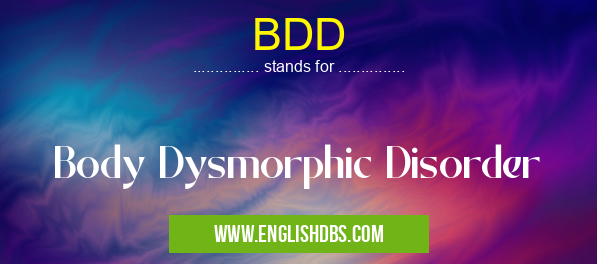What does BDD mean in NURSING
BDD (Body Dysmorphic Disorder) is a mental health condition in which a person is preoccupied with perceived flaws in their appearance. These flaws are often minor or unnoticeable to others, but the individual with BDD experiences significant distress and anxiety about them.

BDD meaning in Nursing in Medical
BDD mostly used in an acronym Nursing in Category Medical that means Body Dysmorphic Disorder
Shorthand: BDD,
Full Form: Body Dysmorphic Disorder
For more information of "Body Dysmorphic Disorder", see the section below.
Symptoms of BDD
- Excessive preoccupation with perceived flaws in appearance
- Repetitive behaviors such as excessive grooming, mirror checking, or skin picking
- Negative body image and belief that they are unattractive or disfigured
- Social withdrawal due to fear of judgment or criticism
- Anxiety, depression, and suicidal ideation
Causes of BDD
The exact cause of BDD is unknown, but it is believed to be a combination of biological, psychological, and environmental factors.
- Biological factors: Studies have shown that people with BDD have differences in the brain regions involved in body image processing and self-esteem.
- Psychological factors: Negative body image, low self-esteem, and perfectionism can contribute to the development of BDD.
- Environmental factors: Exposure to media that promotes unrealistic beauty standards and social media platforms where people compare themselves to others can exacerbate BDD symptoms.
Treatment for BDD
BDD can be effectively treated with a combination of therapies, including:
- Cognitive-behavioral therapy (CBT): CBT helps individuals challenge negative thoughts and behaviors related to their appearance.
- Medication: Antidepressants and anti-anxiety medications can be helpful in managing the emotional distress associated with BDD.
- Support groups: Support groups provide a safe and supportive environment for individuals with BDD to connect with others who understand their struggles.
Essential Questions and Answers on Body Dysmorphic Disorder in "MEDICAL»NURSING"
What is Body Dysmorphic Disorder (BDD)?
BDD is a mental health disorder characterized by a persistent preoccupation with a perceived flaw in one's appearance that is either nonexistent or appears minor to others. This preoccupation causes significant distress and impairs daily functioning.
What are the symptoms of BDD?
Common symptoms of BDD include:
- Excessive preoccupation with a perceived physical flaw
- Repetitive behaviors such as mirror checking, grooming, and comparing oneself to others
- Seeking reassurance about one's appearance
- Avoiding social situations due to fear of being judged
- Depression, anxiety, and suicidal thoughts
What causes BDD?
The exact cause of BDD is unknown, but it is thought to involve a combination of genetic, psychological, and environmental factors. It is often associated with perfectionism, low self-esteem, and family history of mental health disorders.
How is BDD diagnosed?
BDD is diagnosed based on a clinical evaluation by a mental health professional. The diagnosis involves evaluating the person's symptoms, ruling out other medical conditions, and assessing the impact on their life.
What are the treatment options for BDD?
The main treatment options for BDD are cognitive-behavioral therapy (CBT), medication, and support groups. CBT helps individuals challenge their distorted thoughts and behaviors, while medication can help manage anxiety and depression. Support groups provide a safe and supportive environment for sharing experiences and coping mechanisms.
Can BDD be cured?
While there is no cure for BDD, symptoms can be effectively managed through treatment. With the right treatment, individuals with BDD can learn to cope with their symptoms, improve their self-esteem, and live fulfilling lives.
Final Words: BDD is a serious mental health condition that can significantly impact an individual's life. With early diagnosis and appropriate treatment, people with BDD can learn to manage their symptoms and improve their overall well-being. By raising awareness and providing resources, we can help those affected by this condition get the support they need.
BDD also stands for: |
|
| All stands for BDD |
